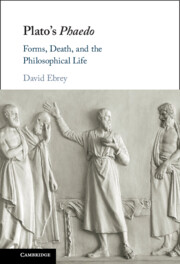Book contents
- Plato’s Phaedo
- Plato’s Phaedo
- Copyright page
- Dedication
- Contents
- Acknowledgments
- Introduction
- 1 The Characters
- 2 The Phaedo as an Alternative to Tragedy and Socrates as a Poet
- 3 Defense of the Desire to Be Dead
- 4 Cebes’ Challenge and the Cyclical Argument
- 5 The Recollecting Argument
- 6 The Kinship Argument
- 7 The Return to the Defense
- 8 Misology and the Soul as a harmonia
- 9 Socrates’ Autobiography
- 10 Cebes’ Objection and the Final Argument
- 11 The Cosmos and the Afterlife
- 12 The Death Scene
- Bibliography
- Index Locorum
- Index
7 - The Return to the Defense
80d–84b
Published online by Cambridge University Press: 02 February 2023
- Plato’s Phaedo
- Plato’s Phaedo
- Copyright page
- Dedication
- Contents
- Acknowledgments
- Introduction
- 1 The Characters
- 2 The Phaedo as an Alternative to Tragedy and Socrates as a Poet
- 3 Defense of the Desire to Be Dead
- 4 Cebes’ Challenge and the Cyclical Argument
- 5 The Recollecting Argument
- 6 The Kinship Argument
- 7 The Return to the Defense
- 8 Misology and the Soul as a harmonia
- 9 Socrates’ Autobiography
- 10 Cebes’ Objection and the Final Argument
- 11 The Cosmos and the Afterlife
- 12 The Death Scene
- Bibliography
- Index Locorum
- Index
Summary
Socrates here draws on the cyclical and kinship arguments to further explain nearly every claim made earlier in the defense speech (Chapter 3). He provides an interconnected account of virtue, happiness, moral psychology, reincarnation, and soul–body interaction. He first describes how coming to know the divine will ultimately allow the philosopher’s soul to spend the afterlife with the gods, eternally happy. By contrast, non-philosophers reincarnate because their desire for the body-like pulls them into a new body after death. Understanding this mechanism requires clarifying how Socrates thinks of the impurities in non-philosophers’ souls. After examining this, the chapter turns to how the body deceives the soul into desiring things that are not good for it. Socrates develops the account of true courage and temperance from the exchange passage (69a–e) to explain how the philosopher avoids and resists the body’s insidious effects so that the soul can pursue wisdom and so be eternally happy.
Information
- Type
- Chapter
- Information
- Plato's PhaedoForms, Death, and the Philosophical Life, pp. 162 - 183Publisher: Cambridge University PressPrint publication year: 2023
